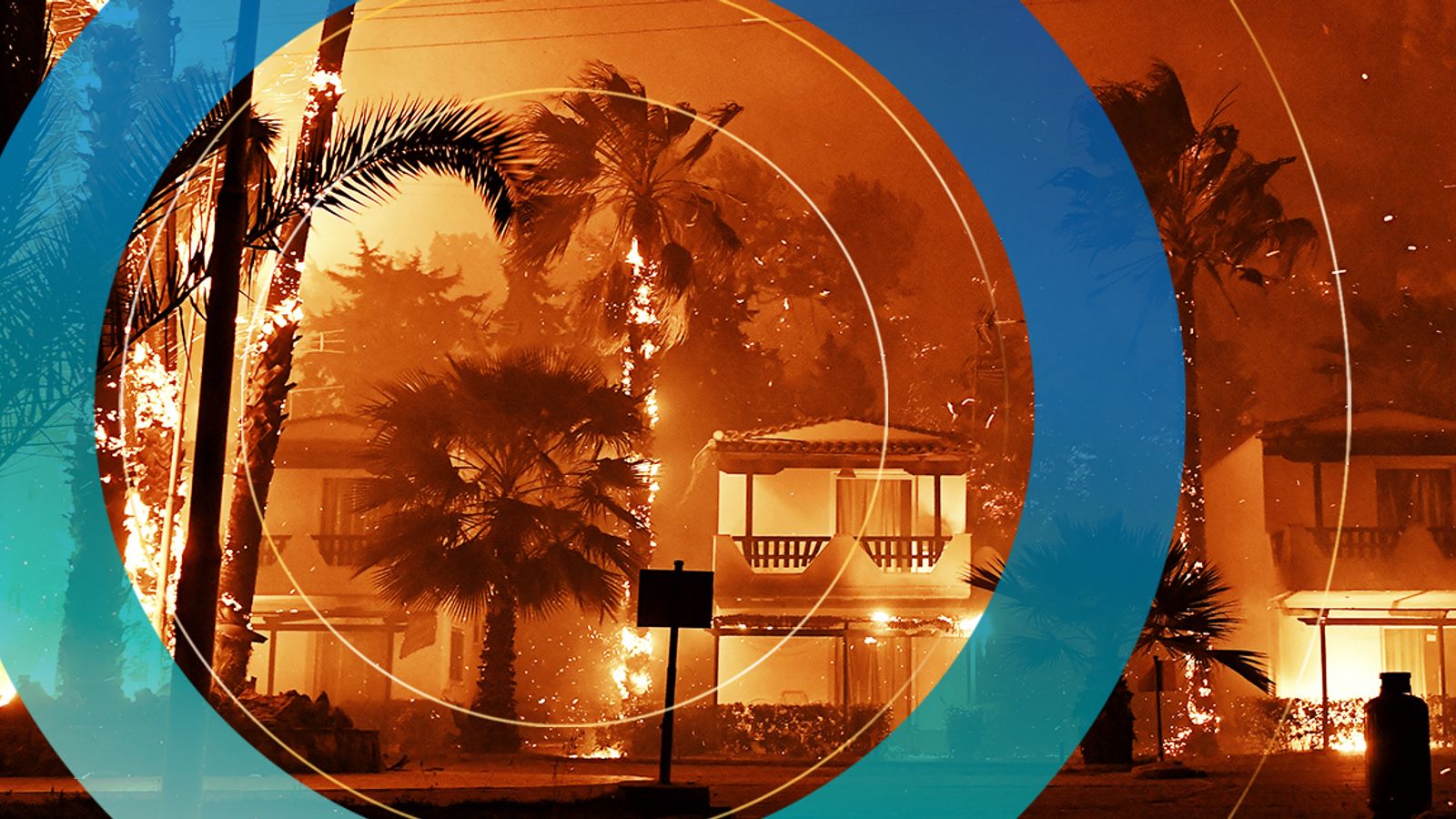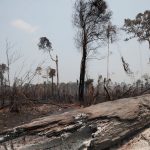Record temperatures, widespread wildfires and devastating flooding.
The world appears to be in the grip of a weather crisis, which seems to be more intense and higher in frequency than anything seen in recent history.
Sky News has looked at the factors which may have contributed to the situation in a number of countries, in an effort to make sense of the causes behind the extreme weather.
Anticyclone “Lucifer” and heat domes
Named after the devil, the anticyclone sweeping across Europe is bringing hot, dry weather to the continent.
Anticyclones occur when the air sinks, rather than rises, causing high pressure – meaning it warms and holds more moisture.
The lack of fronts means the winds are often light and the high pressure brings settled, dry and bright weather.
Lucifer and its heat has travelled north from Africa, bringing what is thought to be the hottest European day on record to Sicily – which baked in 48.8C (119.8F) on Wednesday.
There are fears in Italy that as the phenomenon spreads, it could bring with it more extreme heat and fires.
A heat dome is similar to an anticyclone, and is when an area of high pressure stays over a large part of a region for days, or even weeks.
Like a lid on a saucepan, it traps hot air underneath, and can cause heatwaves with temperatures well above the norm.
Met Office spokesman Stephen Dixon told Sky News: “The jet stream has dipped south across western Europe and extended into northeast Europe, allowing a ridge to develop across southeast Europe.
“Within the ridge, the air has become warmer day-on-day.”
Italy
Italian firefighters are continuing to battle blazes which have engulfed Sicily amid its scorching record temperature.
Wildfires have swept through the island, destroying trees and threatening homes.
There were also fires along the country’s Adriatic Coast last week, which left several people injured as they tried to extinguish flames by their homes.
However, the fires come after intense flooding only a week or so beforehand, which triggered mudslides near Lake Como.
Arson is being looked at as a possible cause, but many experts link the extreme weather to climate change.
Greece
Greek firefighters have spent the last few days trying to tame some of the most intense fires in its history, as wildfires threatened the capital, Athens.
Teams from the UK were brought into help, who told Sky News that fires were spreading within minutes, and that the changing wind directions and the 40C heat was making battling the flames more difficult.
Taking about the cause of the fires, Prime Minister Kyriakos Mitsotakis said: “It is obvious that the climate crisis is affecting the whole planet.
“That is the explanation, but not an excuse, or an alibi. We may have done everything that was humanly possible, but in many cases this did not seem to be enough in the unequal battle with nature.”
Please use Chrome browser for a more accessible video player
Turkey
Fires raged across Turkey’s Mediterranean Coast during the last week, with residents saying they were like nothing they’d ever seen.
At one point there were more than 120 fires across the country, which killed eight people, and injured dozens more.
Fires are common in southern Turkey during the hot summer but experts have said this year’s are much bigger than usual.
Authorities are investigating possible arson but scientists have blamed the fires on climate change, with temperatures five or six degrees higher than the average for this time of year.
Meanwhile, in the north of the country, torrential flooding has triggered mudslides in a case of one extreme to the other – something scientists say is also likely the impact of climate change.
Please use Chrome browser for a more accessible video player
Algeria
At least 65 people have been killed in wildfires that erupted in the north African country of Algeria.
The fires have been ravaging forests and villages east of the capital, Algiers, in the Kabyle region, covering the mountainous area with thick clouds of smoke.
Prime Minister Ayman Benabderrahmane told state television the blazes appeared to be “highly synchronised”, adding that “leads one to believe these were criminal acts”.
He has asked other countries for help, adding the region has no water-dumping aircraft.
Please use Chrome browser for a more accessible video player
USA
The western area of the US, particularly in California, is no stranger to searing hot weather and wildfires.
However, a three-week-long blaze has raged in California – the Dixie Fire – and is now the eighth largest in the state’s history.
Only a single building remains in Greenville, a Gold Rush town, after fires engulfed the whole area, while flames continue to rage through the state’s smaller communities.
The Dixie Fire remains only around 30% contained, and still threatens around 10,000 homes in northern California.
There are also fires in nearby Oregon and Washington state – with politicians and scientists blaming climate change for the uptick in wildfires.
Subscribe to ClimateCast on Spotify, Apple Podcasts, or Spreaker.






















